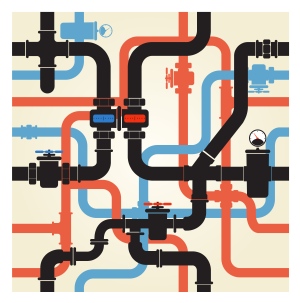Commissioning management gets more demanding

The skills required of a commissioning manager continue to evolve and become more complex. Chris Parsloe gives an insight.
Commissioning management can be hugely beneficial to large complex projects but the complexity of modern heating and chilled-water systems puts pressure on commissioning managers to keep up with the changing requirements.
The potential for a commissioning-management role was first defined at BSRIA commissioning meetings I chaired in the late 1990s. Experienced commissioning specialists at these meetings were beginning to offer a new management service as well as hands-on commissioning.
These discussions led to the formation of a new steering group to address commissioning management and to prepare a new guide on the subject. This led to the publication of BSRIA AG5/2002 ‘Commissioning management — how to achieve a fully functioning building’. This was then used as a source document for the better known CIBSE Code M which was released in 2003.In short, the role of the commissioning manager was to assist with the management of commissioning including the following main activities.
• commissionability reviews
• programming of commissioning (and related activities)
• over-seeing and checking of commissioning
• witnessing of results.
The commissionability review is critical. For the CIBSE/BSRIA recommended commissioning process to be successful, systems have to be commissionable. This means that all the required regulating valves, differential pressure control valves, flow measurement devices and pre-commission cleaning features have to be in the system ready for when the commissioning process starts.
As part of a commissionability review, schematics of pipework systems should be checked to ensure that the features recommended in BSRIA Guide BG29/2012 ‘Pre-commission cleaning’ are included. Designers often leave it to the installer to add these features, but many installers are unaware of the guide’s contents. This means that some systems cannot be flushed in accordance with the guide or require expensive modification to make it possible. The commissioning manager should be aware of the requirements and ensure that they are included in the installed system.

Programming of the works can also have a major impact on commissioning and water quality. Many installing contractors are unaware of the effects various actions may have on water quality. For example, Long periods between pressure testing and cleaning or draining down systems that have been cleaned can cause damage to pipes and components by enabling corrosion or micro-biological contamination to occur.
Other potential hazards are similarly difficult to predict.
For example, the apparently innocent suggestion to operate a system temporarily without pressurisation units (because the cold-water supply is not yet available) and at a reduced temperature (around 40°C) to enable building finishes to dry out might seem reasonable. However, these conditions can potentially lead to high oxygen ingress and ideal breeding conditions for bacteria — a combination than can rapidly eat through steel pipes. Commissioning managers need to have an appreciation of these issues in order to avoid commissioning programmes that could lead to problems.
The task of identifying the correct locations for valves with a commissioning-related function is now made far more complicated by the advent of differential-pressure control valves (DPCVs). These valves are seldom specified with their intended differential-pressure control values. This means commissioning specialists will usually set them up based on flow rate. This is not always appropriate and should always be checked. In many cases the valves are wrongly located so that they will not provide the necessary pressure limitation required. The commissioning manager should at least understand the role of the DPCV and ask the designer to provide the correct information regarding their settings and intended function.
Witnessing flow rates is another important function of the commissioning manager, but as I’ve discussed in previous articles for MBS, there is a strong argument to suggest UK commissioning procedures are somewhat over-focused on flow rates. Prolonged debates over the acceptability of flow settings that are outside of the normal tolerance limits of CIBSE Code W should not be occurring especially if flows are very low (less than 0.015 l/s) and, more importantly, are occurring in variable-flow systems where flow return temperature is actually more important to system performance than the flow itself. A commissioning manager with a good understanding of these issues can ensure that witnessing flow rates doesn’t become bogged down in an ultimately pointless debate over repeatability.
Finally, witnessing the results from a pre-commission cleaning process requires a particularly specialised understanding. The latest revisions of the BSRIA pre-commission cleaning guide have significantly increased the amount of detail explaining what constitutes a clean pipework system. There is also new guidance on how systems are to be maintained and monitored to ensure that there is no deterioration in water quality between the finish of the clean and handover of the building. Commissioning managers, as the party witnessing the results on behalf of the client or main contractor, must have a complete understanding on how to interpret the guidance.
Chris Parsloe is director of Parsloe Consulting.







